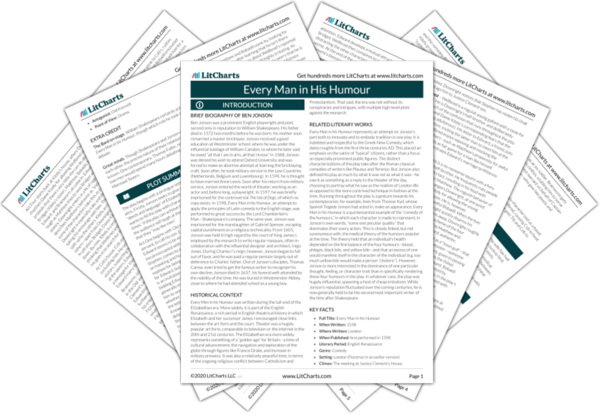Humours Quotes in Every Man in His Humour
Act 2, Scene 3 Quotes
A new disease? I know not, new, or old,
But it may well be called poor mortals' plague;
For, like a pestilence, it doth infect
The houses of the brain. First it begins
Solely to work upon the fantasy,
Filling her seat with such pestiferous air,
As soon corrupts the judgment; and from thence,
Sends like contagion to the memory:
Still each to other giving the infection.
Which, as a subtle vapour, spreads itself
Confusedly through every sensive part,
Till not a thought, or motion, in the mind,
Be free from the black poison of suspect.
Ah, but what misery is it, to know this?
Or, knowing it, to want the mind's erection
In such extremes? Well, I will once more strive,
(In spite of this black cloud) myself to be,
And shake the fever off, that thus shakes me.
Act 3, Scene 1 Quotes
STEPHEN: Ay, truly, sir, I am mightily given to melancholy.
MATTHEW: Oh, it's your only fine humour, sir: your true melancholy breeds your perfect fine wit, sir. I am melancholy myself, divers times, sir, and then do I no more but take pen and paper presently, and overflow you half a score, or a dozen of sonnets at a sitting.
Act 3, Scene 4 Quotes
COB: Humour! Mack, I think it be so indeed; what is that humour? some rare thing, I warrant.
CASH: Marry I'll tell thee, Cob: it is a gentlemanlike monster, bred in the special gallantry of our time, by affectation; and fed by folly.
Act 5, Scene 2 Quotes
JUSTICE CLEMENT: Nay, keep out, sir; I know not your pretence. You send me word, sir, you are a soldier: why, sir, you shall be answered, here, here be them that have been amongst soldiers. Sir, your pleasure.
BOBADIL: Faith, sir, so it is, this gentleman, and myself, have been most uncivilly wronged, and beaten, by one Downright, a coarse fellow, about the town, here, and for mine own part, I protest, being a man in no sort given to this filthy humour of quarrelling, he hath assaulted me in the way of my peace; despoiled me of mine honour; disarmed me of my weapons; and rudely, laid me along, in the open streets: when I not so much as once offered to resist him.
JUSTICE CLEMENT: Oh God's precious! Is this the soldier? Here, take my armour off quickly, ‘twill make him swoon, I fear; he is not fit to look on't, that will put up a blow.












